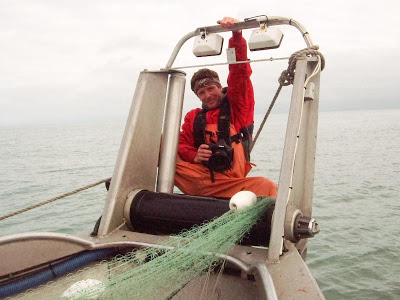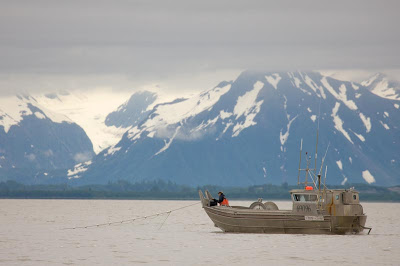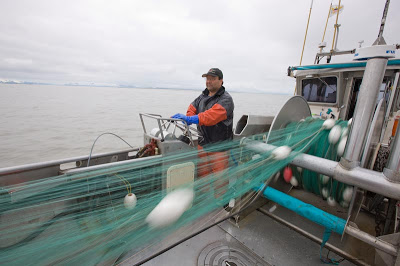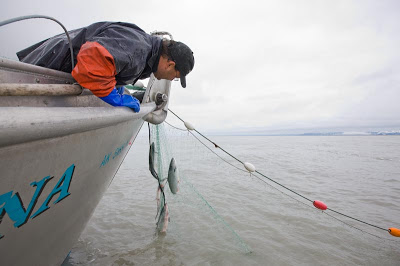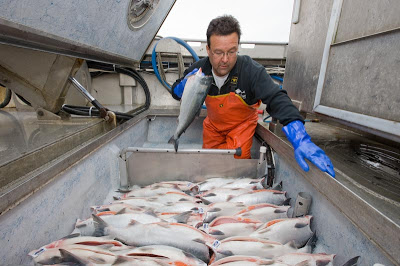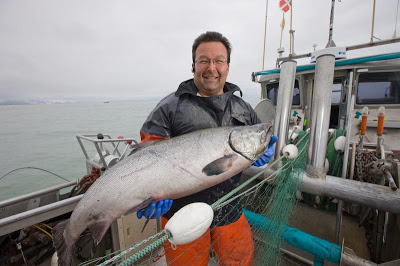As part of an ongoing assignment (see part one and part two) covering the copper river red salmon, I traveled to Cordova, Alaska to join a commercial fishermen during the current, once a week 12 hour period for the Copper River gillnet fishery.
The great Copper River pours into the Gulf of Alaska in southcentral Alaska, depositing its turbid waters full of glacial silt and sand creating an array of shallow sand bars and and shoals. The fishermen of the Delta use bow-picker jet boats by majority, which enables fishing in these shallow waters. A 900 foot net is released into the water suspended above by small floats and a lead line below helps the net hang down in the current. The net (and boat) drift along with the current for about an hour or so, before a large wheel reels in the net along with the catch. The fish are caught in the net by the gills.
Hauling in the net
My special thanks to the generosity of commercial fisherman Bill Webber for letting a total stranger join him. Bill has more than 40 years experience fishing the Copper River Delta, and currently operates an innovative and progressive business where he processes his fish at sea and sells direct to restaurants in the lower 48. (Gulkana Seafoods Direct)
Sockeye salmon caught in the gillnet
This takes a blend of skills, which Bill implements well. The “processed at sea” attribute is one more effort to increase the quality of an already amazing product. Bill takes extensive care in handling the fish in order that they are not inadvertently bruised. In addition, they are live bled quickly, headed and gutted, then pressure bled, and quickly hand packed with ice and put in the hold. This practice is more common in the troll fishing industry, but he is introducing it to the gill net fishery. The fish are generally sent out the following day on Alaska Airlines jets.
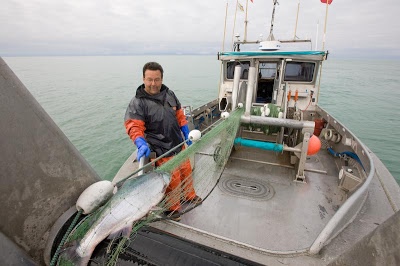 Salmon coming over the bowroller.
Salmon coming over the bowroller.
Packing the hold with processed fish.
His boat named the “Gulkana” (one of the headwater rivers of the Copper) is fitted with satellite phone/internet and he can literally take orders from restaurants as the catch of the day unfolds! Which is a pretty slick operation.
Mixed in with the run of red salmon are the king salmon, and we netted a very nice one weighing in about 50 pounds. In case you are wondering, that single fish fetches about $700 on the (direct, processed at sea) restaurant market!
50 pound King salmon nets $700 on the processed at sea direct market.
Conditions were not optimal for photography, very flat light, gray sky and gray water. And the density of the fishing fleet (500 plus boats) has dispersed to other parts of Prince William Sound in part due to the economics of a low salmon run, reduced opening periods and the cost of fuel. It was a great experience and I captured a few o.k. photos.
Interestingly, the perspective I like the most was from the last set of the day, just before closing, when an increased sense of “I need to work this differently” prompted the idea of hanging off the bowroller for a look back as the fish came on board the boat. Of course, having another vessel to shoot from would have been optimal, but it was not available. Bill got a rope which we rigged up to enable me to lean back against it for support and shoot a few frames.

